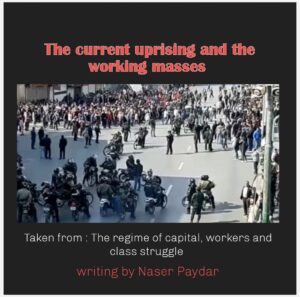Movement of anti wage-labor and organizing workers by council !
( By. Naser Paydar )
The discussion of councils has a very long history but as old this argument is , the reformist and social-bourgeois inversions about council have also an old background . In the same direction raising the issue with an anti wage-labor´s narrative is largely new . Any phenomenon related to class struggle has no individual , sectarian or scholastic inventor or innovator , and dialogue about the anti wage council movement is also not the invention of any particular person , but it´s the conscious , organized and with a wide range of perspective by class struggle of the working masses against wage slavery . Considering all these aspects and facts , it´s worth mentioning that the framework of the current words , some years ago in one of the issues of our bulletin was discussed , in opposite to many different perceptions so far on the issue of councils . The subject of council organizing against wage-labor of the working class isn´t absolutely specific to the day and period or ups and downs of the class struggle of the working masses . But the current conditions of the Iranian labor movement objectively have emphasized the need to insist as more widely and strongly as possible on the urgency of creating councils against wage slavery of the working masses as an urgent task in front of any real radical activist of this movement . In this regard, and in completing what has been said so far, it seems necessary to remind the following points .
1. The foundation of the council debate for the labor movement isn´t based on how the organizational structure , guarantee of democracy or refining the working class organization from bureaucracy but is about its anti-capitalist nature and anti-wage labor . The last two phrases are just two terms to express a fact . Oppose to capitalism without radical opposition to wage labor , not an approach of anti-capitalism of proletarians but is a kind of capitalist reformism . What separates the workers´ council from other forms of working class organization is the basic nature of its anti wage-labor .
2. The council is only substrate of growth , cohesion and organizing , consciousness , authorization and exercising class power and the rise of the working class to struggle against exploitation and all forms of deprivation of rights caused by capital and in the same direction the real form of final deal with capitalism and establishment of communism of abolition wage labor . We´ve already stated that the labor movement´s class existence has this capacity of being anti wage-labour , being a growing, aware and united and organized struggling movement which combines its daily struggle with the strategy of uprooting capitalism . In the meantime it´s involved in all realms of human social life and being in a position for leading a radical class struggle against any kind of deprivation of rights arising from the existence and domination of capitalism .This movement of anti wage-labor is capable to organize an uprising and revolution that overthrows the state of capital and eventually establish the communism of abolishing of wage-labor . The labor movement has this capacity but no verse has been revealed from anywhere that the working class of this or that society or world´s labor movement will do so , as if they´ve not done so to date and such an incident hasn´t happened yet . The labor movement to achieve the position in question must continuously improve its organizing and fortification capacity in all trenches of social life against the capitalist system . In the struggle between the proletariat and the bourgeoisie , the principle for exercising of anti wage-labor power is the basic criterion of maturity and dynamism , awareness growth and rise in the class struggle . This principle applies in all realms of struggle and in all the mazes , ups and downs , victory and defeat , in the battlefield of wages and working conditions and social welfare , freedoms and political rights , conflict with the political regime , fighting gender , ethnic and racial inequalities and in all realms . When 400,000 Indian workers leave the negotiation table of trade unions and employers with firm determination and in the same time they break the wave of attacks of the capitalist state and attempt to raid the workshops and houses of the capital owners very powerful to add a couple of cents to their meager wages . They´re definitely fighting against capitalism , however , their total demand shouldn´t exceed a few dollars a month . The Indian workers didn´t accept any compromise framework in the process of this struggle , maybe they do it little later or maybe not . But the verdict on them can not be issued on the basis of retribution before the crime . The opposite is true of workers´ fights within unions . Here , the workers even when they exercise power , but the foundation of this show of strength is compromised with a rotten framework of surrender , abandonment of the class struggle and are locked in accepting wage slavery . Any radical spontaneous anti-capitalist movement of workers is constantly subject to compromise and the fate of the trade union movement , and in order not to suffer such a destiny it must be against wage labor in all stages and realms , type of claims , wide range of battle and a substrate of organizing . The role of pioneers is discussed here and in the depth of this movement . Being a councilor and the active presence of the conscious and solutioner of the communist workers , this is where it gets all its importance and relevancy . Council organizing is the only form of strong connection and continuous of wel-informmed and pioneers and the activists of anti wage-labor with the masses of workers . The council means a substrate of presence of the working class , a place for the conscious and practical connection of the pioneers and the working masses , where all people in credit of being workers and independent of the level of political awareness and knowledge or any other distinction go hand in hand .
3. Council organizing of the working class is in a serious class onfrontation with the trade union movement on the one hand and conventional social bourgeois party-building , even under name of the bourgeois communism , on the other hand . Both types of recent formation are the rwin born of peaceful and militant social reformism in connection with the world labor movement . The first (trade union reformism) is the manifestation of the workers´ strategic abandonment and avoidance of the struggle against capital , announcing the practice and history of the closure of the class struggle and the signature of acceptance of the immortality of the wage slavery system . The second (social bourgeois militant parties) is the organizational solution of sections of the bourgeoisie for the workers´ movement with aiming to drive and stop the workers´ movement in order to settle and reaction and deal with other strata of the bourgeois reactionary , achieving a dominant role in the state machinne of capital and replacing one type of capitalist labor and production planning with another one . Both of these tendencies are at odds with the organizing of the anti wage-labor of workers’ councils . The first tendency denies every council liveliness of the working-class messes , and the other tendency , conversely , it usually speaks along with the excitement but deceptive about councils but the councils in question aren´t a substrate for the workers´ struggle against capital , but quite the opposite , is substrate for the catastrophic hanging of the anti wage-labor movement on the gallows of the reactionary dreams of the establishment of the bourgeois socialism the state capitalism under the rule and leadership of sections of the bourgeoisie ( bourgeois communist-pretender parties ) .
4. The labor movement in the same style and context that is anti-capitalist in its social institutional nature , in the same way is council-like . When every kind of protest and strike and uprising of the working masses is more collective , united and broader which can pave the way for victory . The just need for unity and extent of battle illustrates the movement´s institutional approach to council organizing . Struggle is the lever of exercise power and the exercise of the class-power of the working class is a definite collective action . Whatever the number of workers participating in a protest , combat and uprising is less the likelihood of success in that struggle or strike will be much lower . But the wider presence of workers in the class struggle isn´t just a physical act but it´s precisely a social and class action , organic and practical intellectual together or according to Marx , the presence of praxis . This kind of involvement and presence of workers in the process of their movement requires the presence of all workers´ thoughts , opinions , initiatives , creativity and ideas . Council organizing is the only form of working class organization which collects these conditions and practices them .
5. The main goal of the class struggle of the working masses is the abolition of capitalism and the establishment of socialism for abolition of wage labor . The only form of organizing of the labor movement that has the capacity to lead such a struggle and the only way for the labor movement to gain the necessary cohesion , awareness and class-power to play this role is formation of such councils against wage-labor . Socialism is an organizing of the labor-power composed of all workers and the influential, free, creative, conscious and united involvement of all of them in the planning of work and production and social life , because cancellation of wage labor is not possible without fulfilling all these conditions . Any kind of organization of laborforce that does not completely abolish the last vein and root of the separation of working masses from the process of labor and social production , will not be able to eradicate capitalism . Socialism is the complete unity of decision-making and implementation , policy-making and the normal process of life , work and productio , the complete end of all forms of human separation from work-planning , politic and government . In socialism , all human beings are present with maximum freedom and power , awareness and involvement and creativity in the unified planning of their own lives . The establishment of socialism requires a movement that prepares the working class within society to meet all the necessary conditions for the realization of this fundamental historical goal and by councils organizing is the only substrate in which these needs are truly met .
6. The establishment of communism of abolition of wage labor is depending on the formation , growth and organizing of a class movement that in all realms of social life has struggled against exploitation , deprivation of rights and oppression of capital and against the foundation of capitalism . With reformism and the struggle for reform , with the anti-regime and supra-class fight , with demand for capitalist democracy and the kind of these can not be establishing the foundation of socialism . The labor movement must fight capital in all spheres of human social life and bring all these realms into the focus of anti-capitalist and expansion of anti wage-labor awareness , the method of exercise anti-capitalist power , class solidarity and to develop like these . For this pirpose , still the council movement is the only substrate and passage which can be resorted to . There can be no other form of formation in line with the process of achieving these goals .
7. Bourgeois socialism has fundamentally distorted the working class council organizing , like all other issues concerning the proletariat class struggle against capital and it has inflicted on it the most misleading social-bourgeois inversion from all sides . The bourgeoisie has , first and foremost , distorted the anti wage-labor of this kind of council organizing and also it has blocked the all ways of attempt to achieve such kind of organizing , and thus the bourgeois socialism has completely denied the nature and coherence of the spontaneous anti-capitalist struggle of the working class and the dynamism and maturity , horizon of vision and cohesion of the labor movement to abolish wage labor . At a briefly glance , to the various leftist narrations of council and the councils movement usually we encounter two seemingly different but in fact homogeneous explanations of this phenomenon . The first narration belongs to a tendency and circles which completely deny the importance of the council movement in the general process of class struggle between the proletariat and capital , that´s why they believe that the councils are the organs of the uprising and only specific to the period of the revolution . It must search and find the real and historical source of this narrative of the council in the side by side of the imcompatible faults of expectations , confrontations and the whole strategy of sections of the bourgeoisie in a periods before the economic political dominance of capitalism in this or that society . This interpretation of the workers’ councils is precisely inextricably linked to syndicalism and the party-building scheme brought by social democracy . The common articulation of all these must be sought in the heart of the perspectives , expectations, criticisms and strategies of sections of the bourgeoisie in the historical context of the day . The forces within the imperialist conditions of capitalist production in close connection with the Soviet Camp and the current political power of Russian society and they did prescribe their own version (state capitalism) of the process of capitalist development in the widest part of the current world . There´s a second version of the council among the leftist spectrum , a narrative that is nothing more than a democratic critique of syndicalism . Here the council is apparently not a special organization for the days of the uprising but at the same time it´s not the basis of an anti-capitalist struggle and anti wage-labor of the working masses . The reason for this is clear . Proponents of such a council don´t accept such a capacity for the current working class movement . This version of the council is a mixture of syndicalist reformism , supra-class anti-regime , and the democratic critique of union bureaucracy .
8. More and more importance of the need to prepare for the occupation of factories and work centers by the working class, the formation of workers´ councils enjoys maximum urgency and vitality . Largest strikes without pre-existing council organizing can take place and even win but the conquest of the factory is impossible without the comprehensive councils of the workinng masses . The conquest of factories has at the same time the most favorable and abundant contexts for the establishment of councils . During each strike, the interactions of the working masses at different levels of activity , the awareness and sensitivity of the manner of the class struggle, automatically adopts a council process . This context of the council being in the absence of effective and efficient support in the context of the labor movement and also without a strong organized connection of pioneer workers activists with the rest of the working masses , it has not much chance of survival and besides the end of the strike could be the end of the council´s activities . In the case of the factory occupation movement , it´s quite the opposite . This movement as long as hasn´t been defeated yet , must be on the offensive and confrontation , and its survival , as long as it revolves around anti wage-labor , needs more maturity , prosperity and the ability of councils organizing .
9. The foundation of workers’ relations in the councils is based on the principle of creative and penetrating , free and informed intervention of all the working masses . A principle that can not be restrained by any other principles and criteria . Here , in councils no one decides for others , and no kind of relations that involve this representation and mandate , will not be established . Representation in the councils , completely , it differs from the narrative of representation in parties , unions and circles on the spectrum of left-wing reformism . Human beings do not elect some people as representatives to become the executors of the representatives’ decisions and the instrument of their will . Representation , at worst status , is merely a mission . Some of workers are elected and sent on a mission as a representative by a large number of the working masses , if it´s inevitable , that is the result of deliberation , debates and decisions made by the electors , they as representative share it with other working masses in another geographical area . These elected people can be removed at any time and under any circumstances that require it and no other license or criterion is required to dismiss them , except the free and collective free will of the majority of the working masses .
Naser Paydar
Aug. 2008


